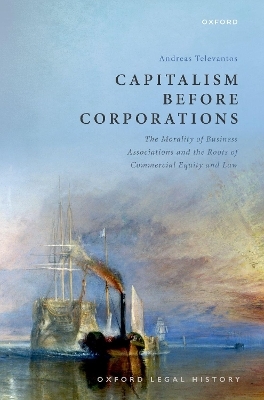
Capitalism Before Corporations
Seiten
2024
Oxford University Press (Verlag)
978-0-19-893363-2 (ISBN)
Oxford University Press (Verlag)
978-0-19-893363-2 (ISBN)
The book examines the extent to which English law facilitated trade before it was possible to create corporations for purely private business purposes. It looks at the extent to which the common law recognised the associational rights of business persons, and its relation with contemporary moral and economic thinking.
To what extent did English law facilitate trade before the advent of general incorporation and modern securities law? This is the question at the heart of Capitalism before Corporations. It examines the extent to which legal institutions of the Regency period, especially Lord Eldon's Chancellorship, were sympathetic to the needs of merchants and willing to accommodate their changing practices and demands within established legal doctrinal frameworks and contemporary political economic thought. In so doing, this book probes at the heart of modern debates about equity, trusts, insolvency, and the justifiability of corporate privileges.
Corporations are an integral part of modern life. We bank with corporations, we usually buy our groceries from them, and they provide us with most news and media. We take it for granted too that most large-scale business, and even much small-scale business, is carried out by corporations. Things were not always so. Televantos considers the Bubble Act of 1720, which criminalised the forming of corporations without a Royal Charter or Act of Parliament, its repeal in 1825, and the subsequent impact. Much of the modernisation of Britain's industry therefore took place before general incorporation was allowed. Unaided by statute, traders had to create business organisations using the basic building blocks of private law: trusts, partnership, and agency.
To what extent did English law facilitate trade before the advent of general incorporation and modern securities law? This is the question at the heart of Capitalism before Corporations. It examines the extent to which legal institutions of the Regency period, especially Lord Eldon's Chancellorship, were sympathetic to the needs of merchants and willing to accommodate their changing practices and demands within established legal doctrinal frameworks and contemporary political economic thought. In so doing, this book probes at the heart of modern debates about equity, trusts, insolvency, and the justifiability of corporate privileges.
Corporations are an integral part of modern life. We bank with corporations, we usually buy our groceries from them, and they provide us with most news and media. We take it for granted too that most large-scale business, and even much small-scale business, is carried out by corporations. Things were not always so. Televantos considers the Bubble Act of 1720, which criminalised the forming of corporations without a Royal Charter or Act of Parliament, its repeal in 1825, and the subsequent impact. Much of the modernisation of Britain's industry therefore took place before general incorporation was allowed. Unaided by statute, traders had to create business organisations using the basic building blocks of private law: trusts, partnership, and agency.
Andreas Televantos is an Associate Professor at the University of Oxford Law Faculty, and the Hanbury Fellow and Tutor in Law at Lincoln College. His research focusses on trusts, fiduciaries, equitable remedies, and legal history.
Introduction
Part 1: Regency era business structures
1: Partnership as organisational law
2: The use of trusts in business structures
Part 2: Binding business assets
3: Ostensible authority and the ordinary course of business
4: Judicial resistance to merchant demands, factors and paternalism in the King's Bench
5: The authority of trustees and executors
Part 3: Business failure, risk, and insolvency distribution
6: Trusts and the risk of bankruptcy
7: Partnership dissolution and bankruptcy
Conclusion
Appendix
Glossary
| Erscheinungsdatum | 01.10.2024 |
|---|---|
| Verlagsort | Oxford |
| Sprache | englisch |
| Maße | 155 x 233 mm |
| Gewicht | 346 g |
| Themenwelt | Geschichte ► Teilgebiete der Geschichte ► Militärgeschichte |
| Recht / Steuern ► EU / Internationales Recht | |
| Recht / Steuern ► Rechtsgeschichte | |
| Recht / Steuern ► Wirtschaftsrecht ► Handelsrecht | |
| ISBN-10 | 0-19-893363-0 / 0198933630 |
| ISBN-13 | 978-0-19-893363-2 / 9780198933632 |
| Zustand | Neuware |
| Informationen gemäß Produktsicherheitsverordnung (GPSR) | |
| Haben Sie eine Frage zum Produkt? |
Mehr entdecken
aus dem Bereich
aus dem Bereich
neueste Manipulationstechniken als Waffengattung der NATO
Buch | Softcover (2023)
Westend (Verlag)
CHF 33,55
Deutschlands Schwäche in der Zeitenwende
Buch | Softcover (2023)
C.H.Beck (Verlag)
CHF 25,20


